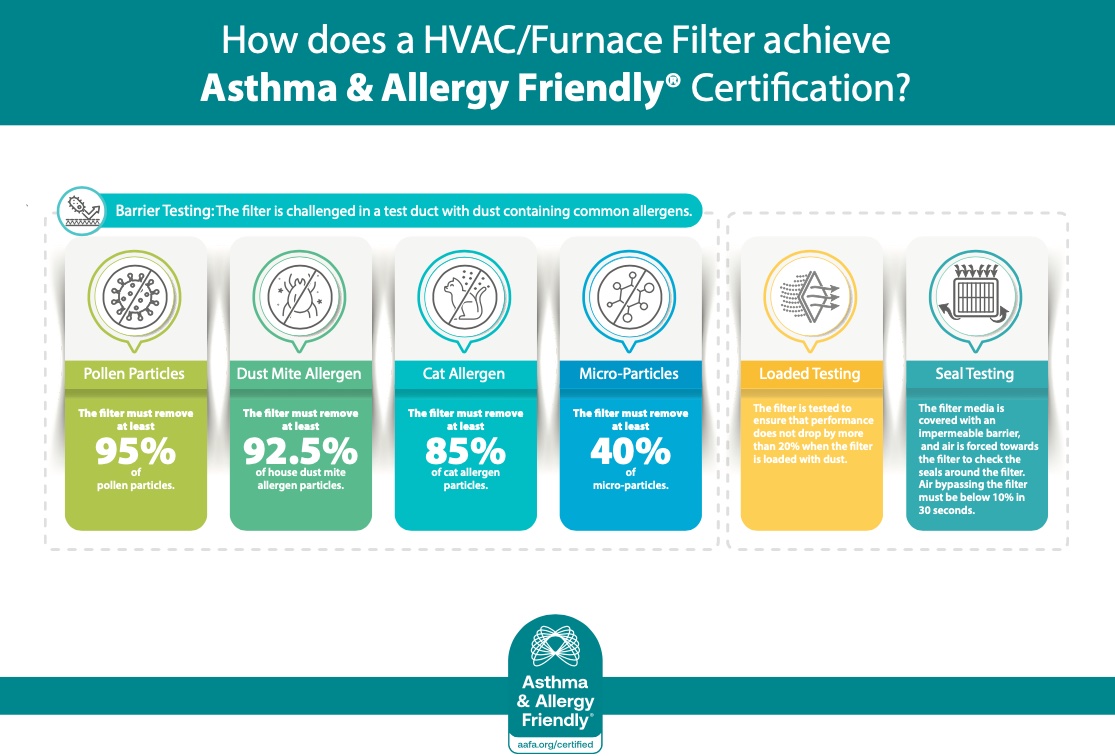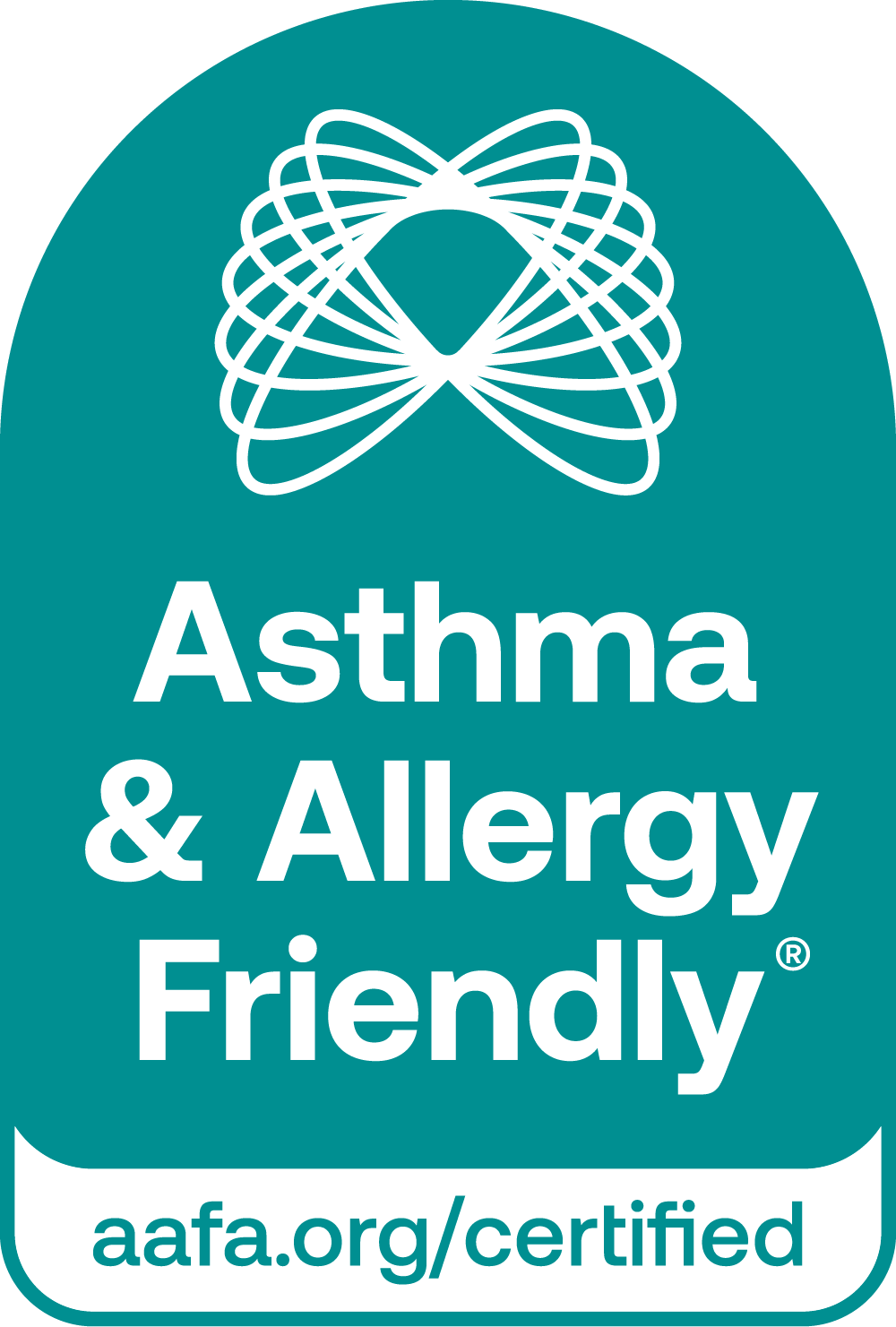Choosing independently certified HVAC filters can significantly improve indoor air quality by reducing allergens and supporting healthier homes—especially during peak asthma and allergy seasons
May is Asthma and Allergy Awareness Month, dedicated to raising awareness about the wide impact of asthma and allergies. Since 1984, the Asthma and Allergy Foundation of America (AAFA) has used this month to highlight the importance of diagnosis, treatment, and management of asthma and allergies.
With 100 million Americans affected by asthma and allergies, May marks a peak season for symptoms. Considering that May is also National Clean Air Month – established to highlight the dangers of air pollution and the importance of clean air – we are taking this opportunity to bring your attention to the air we breathe and its impact on asthma and allergies.
Did you know the average person spends 90% of their time indoors, where air quality can be up to 5 times more polluted than outside? On average, we breathe 2,000 gallons of air daily, making indoor air quality (IAQ) a crucial factor to consider in the management of these conditions.
Climate change is worsening these challenges by lengthening allergy seasons, increasing asthma triggers, and boosting pollen concentrations. This intensifies the need for improved IAQ, as climate change negatively impacts the health of vulnerable populations. HVAC systems and filters can play a vital role in improving IAQ by removing airborne contaminants such as pollen, dust mite allergens, and pet dander.
In this article, we’ll discuss how HVAC filters contribute to IAQ, the importance of choosing validated, certified filters, and introduce our Certified partners, Kimberly-Clark with the Kleenex® Brand Allergen Air Filters and 3M with Filtrete™ Air Filters, who are committed to improving indoor air quality nationwide.
Why Indoor Air Quality Matters
IAQ is a fundamental factor in creating a healthy living space, especially for people with asthma or allergies. Pollutants such as pollen, dust mite allergen, pet dander, and mold spores can accumulate indoors and become airborne within the breathing zone, leading to respiratory issues and exacerbating symptoms for those with sensitivities. Poor IAQ has been linked to a range of health problems, including asthma, allergic reactions, and long-term respiratory conditions.
In many homes, HVAC systems are the primary means of circulating air. However, these systems can also distribute allergens and other harmful particles throughout the home if they aren’t equipped with effective filtration systems. This makes the choice of HVAC filters crucial in managing and improving indoor air quality.
How HVAC Filters Improve Indoor Air Quality
HVAC filters are designed to trap and remove a variety of airborne contaminants, including allergens like pollen, dust mite allergen, and pet dander. By preventing these particles from recirculating throughout your home, HVAC filters reduce common asthma and allergy triggers.
In addition to allergen removal, HVAC systems can also help regulate humidity levels. Maintaining indoor relative humidity (RH) between 40-50% is ideal for comfort and health. High humidity levels can promote mold growth and increase dust mite allergen levels, both of which are common triggers for asthma and allergies. By regulating humidity, HVAC systems not only improve air quality but also create an environment less conducive to these allergens. A further benefit of having an efficient HVAC system is that proper ventilation can help reduce energy costs by up to 30%.
Choosing Independently Tested and Validated HVAC Filters
When selecting a filter for your HVAC system, it’s important to choose one that has been independently tested and validated for its effectiveness in improving IAQ. The Asthma & Allergy Friendly® Certification Program provides this assurance. Products that receive this certification have undergone rigorous testing to meet strict criteria for reducing allergens and improving overall air quality in your home.
The certification process involves several key tests to assess a filter’s performance in removing specific allergens such as pollen, dust mite allergen, and cat dander. The Asthma & Allergy Friendly® standard requires that HVAC filters capture at least 85% of cat allergen, 92.5% of dust mite allergen, and 95% of pollen allergen. Microparticles (<1.0 microns in size) are harmful as they can penetrate deep into the lungs, potentially causing respiratory issues. As such, the certification assesses the HVAC filter to ensure it removes at least 40% of microparticles from the air.
In addition to allergen removal, the certification process ensures that filters maintain their performance even when they become loaded with dust, which commonly occurs in typical home environments. As dust accumulates on the filter, its effectiveness can decrease, and the HVAC system may have to work harder to push air through the clogged filter. The Asthma & Allergy Friendly® Certification Program ensures that filters maintain airflow and effectiveness, even when dusty, with less than a 20% reduction in airflow compared to a clean filter.
Another key part of the certification process is testing the integrity of the filter’s seals. If the seals are weak, air and particles may bypass the filter, reducing its effectiveness. The certification process ensures that bypass is minimal, with less than 10% air bypass within 30 seconds of testing.

Introducing Our Certified Partners: Kleenex® Elite Allergen Air Filters and Filtrete™
We are proud to work with Kleenex® Elite Allergen Air Filters and Filtrete™ Air Filters from 3M as Certified partners in the Asthma & Allergy Friendly® Certification Program.
- Kleenex® Elite Allergen Air Filters (new partner since February 2025): We were delighted to welcome Kleenex®Air Filters to our Certification Program earlier this year. On achieving the certification, Sharnell Weathersby Senior Brand Manager, Kimberly-Clark said
“Kleenex® is already a household name dedicated to life’s moments, and with the addition of the new Kleenex® Air Filters we support a healthier indoor environment for your home and family. We are especially proud of the Asthma & Allergy Friendly® certification that helps demonstrate our commitment to quality and helping improve indoor air quality.”
- Filtrete™ (a partner for 11 years): A trusted name in air filtration, Filtrete™ has been part of the Asthma & Allergy Friendly® Certification Program for over a decade. With a strong reputation for quality and innovation, Filtrete™ offers a range of filters that meet the rigorous standards of the program. The 3M brand promise of “Science Applied to Life” is mirrored in our commitment to science, innovation, and client satisfaction. Over the years, Filtrete™ has expanded its product range to include multiple Certified Air Filters for improving indoor air quality.
The Importance of Certification
Choosing an independently tested and validated HVAC filter, such as those certified by the Asthma & Allergy Friendly® Certification Program, provides peace of mind that you are making an informed decision for your home’s air quality. This certification is more than just a label; it indicates that the product has met stringent standards for allergen reduction, performance in real-world conditions, and overall effectiveness in improving indoor air quality.
Conclusion
Indoor air quality is a fundamental aspect of maintaining a healthy home environment, especially for those with asthma and allergies. HVAC filters play a significant role in improving IAQ by reducing allergens and micro-particles.. By choosing independently tested and validated products, such as those Certified by the Asthma & Allergy Friendly®Certification Program, you can ensure that your HVAC system is up to the task of providing a healthier environment for you and your family.
As we observe Asthma and Allergy Awareness Month, we encourage you to explore Certified HVAC filters from trusted brands like Kleenex® Elite Allergen Air Filters and Filtrete™, and take proactive steps to improve the air quality in your home.
